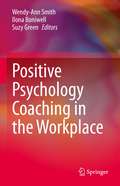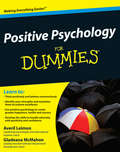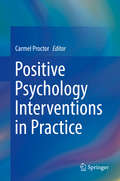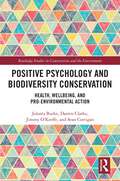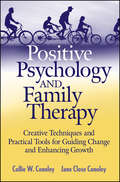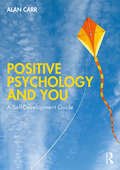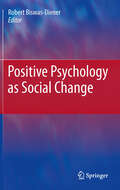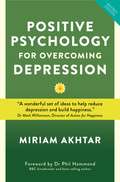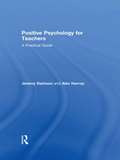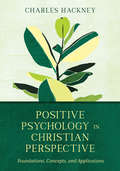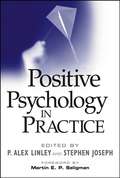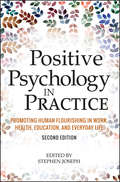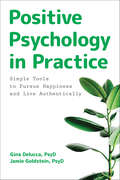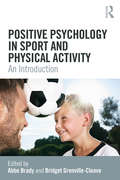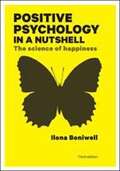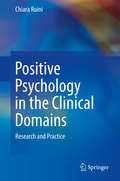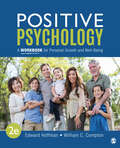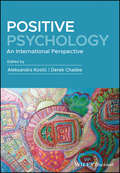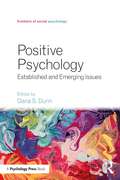- Table View
- List View
Positive Psychology Coaching in the Workplace
by Suzy Green Ilona Boniwell Wendy-Ann SmithThis research-to-practice text explores how coaching can support thriving in the workplace. It focuses on positive psychology coaching in the workplace in relation to: the convergence with organisational psychology and coaching psychology, professional and ethical practices, resilience and wellbeing, team and systemic approaches, leadership, tools of intervention, convergence of clinical interventions and virtuousness, and the future of thriving workplaces. The chapter contributions represent a truly international scholarship and bring together complementary perspectives from the fields of positive psychology, coaching psychology, organisational psychology, organisational scholarship, neuroscience, education and philosophy. Written in a scholarly but accessible style, this text is of interest to a wide readership, including academics, professionals and postgraduate students of positive psychology, organisational psychology, counselling and coaching psychology, human resource management, mental health, health and social welfare. "Smith, Boniwell and Green have brought together an outstanding collection of thought leaders from the field of positive psychology coaching to craft an in-depth exploration of the contribution positive psychology can make to delivering transformation change through coaching conversations. A fascinating read, full of evidence and insight". Jonathan Passmore Professor of Coaching & Behavioural Change Director Henley Centre for Coaching, Henley Business School
Positive Psychology For Dummies
by Gladeana Mcmahon Averil LeimonWhy do some people achieve greater success and happiness than others? The key is positive psychology.For most of its history, psychology has focused mainly on the darker side of human behaviour - depression, anxiety, psychosis and psychopathic behaviour. In 1998, Martin Seligman became president of the American Psychological Association and inspired a movement to focus on the positives in human behaviour.Positive Psychology For Dummies:Taps into the burgeoning media focus on happiness and positive mental attitudeProvides key information on the origins, theory, methods, practitioners and results of positive psychologyDemonstrates how to understand what makes you tick, how to hone positive emotions and how to use positive philosophy for success in both your personal and working lives.Is perfect for a wide audience, from those wanting to get more out of their life, to psychology students or counsellorsAbout the authorGladeana McMahon is co-author of Performance Coaching For Dummies. She is regarded as one of the UK's top ten coaches.Averil Leimon is co-author of Performance Coaching For Dummies. She is a business psychologist and a leading UK leadership coach.
Positive Psychology Interventions in Practice
by Carmel ProctorThis book presents recent advancements in positive psychology, specifically its application across broad areas of current interest. Chapters include submissions from various international authors in the field and cover discussion and presentation of relevant research, theories, and applications. The volume covers topics such as CBT, Psychotherapy, Coaching, Workplaces, Aging, Education, Leadership, Emotion, Interventions, Measurement, Technology, Design, Health, Relationships, Experiences, Communities. With the growing interest in the applications of positive psychology across diverse fields within psychology and beyond, this book will make a worthwhile contribution to the field. It will also fill the current need for a volume that highlights specifically the various recent advancements in positive psychology into diverse fields and as such will be of benefit to a wide range of professionals, including psychologists, educators, clinicians, therapists, and many others.
Positive Psychology Perspectives on Foreign Language Learning and Teaching
by Danuta Gabryś-Barker Dagmara GałajdaThis book introduces readers to the principles of a fairlynew branch of psychology - positive psychology - and demonstrates how they canbe applied in the context of second language acquisition in a naturalenvironment and in instructed foreign language (FL) learning. It focuses bothon the well-being and success of the learner and the professional and personalwell-being of the teacher. Further, the book stresses the importance of thepositive emotions and character strengths of those involved in the process oflanguage learning and teaching, as well as the significant role played byenabling institutions such as school and, at the micro-level, individual FLclasses.
Positive Psychology and Biodiversity Conservation: Health, Wellbeing, and Pro-Environmental Action (Routledge Studies in Conservation and the Environment)
by Darren Clarke Jolanta Burke Jimmy O'Keeffe Sean CorriganThis book reveals how pro‑environmental actions can boost individuals’ and communities’ psychological, social, and emotional wellbeing, resulting in positive environmental changes.Pro‑environmental actions are often viewed as being motivated by anxiety, shame, or anger. However, emerging research indicates that they can also become a source of positive affect, life meaning, engagement, and other wellbeing outcomes. This book turns the current research and practice of pro‑environmental action on its head. Drawing from the field of positive psychology, a rapidly developing science of wellbeing, the book explores new perspectives on how researchers and practitioners can influence engagement in pro‑environmental initiatives. It provides ways in which individuals passionate about the environment can reframe their feelings and thoughts and allow their newly gained perspective to improve their wellbeing, and outlines approaches to support and encourage those less motivated to engage in pro‑environmental actions. The book draws on research from the biodiversity project called Let It Bee, but also looks at examples of other pro‑environmental research, such as water conservation, recycling, and reducing the consumption of meat. This book can be used as a guide for changing how stakeholders motivate people to engage in pro‑environmental action.This book will be essential reading for students and scholars of biodiversity conservation, environmental sustainability, ecosystem services, and environmental psychology.
Positive Psychology and Family Therapy
by Conoley Jane Close Conoley Collie WyattAn affirming guide equipping family therapists to effectively incorporate positive psychology within their practices The next step in the evolution of family therapy, positive psychology has enabled family therapists to help families--whatever their form--to build upon their strengths, overcome dysfunction, and move to new levels of harmony and thriving. Positive Psychology and Family Therapy: Creative Techniques and Practical Tools for Guiding Change and Enhancing Growth integrates positive psychology into traditional family therapy, presenting therapists with best-practice wisdom and evidence-based clinical tools to help?turn dysfunctional or troubled families into flourishing families. Contributing a unique perspective to the field that combines the research, practice, and theory associated with the latest in positive psychology and family therapy, Positive Psychology and Family Therapy equips therapists to cultivate virtues, such as empathy, kindness, responsibility, involvement, social justice, work ethic, teamwork, purpose, and volunteerism. Filled with homework assignments and exercises that integrate positive techniques and interventions, this book establishes and promotes the family as the basic building block of the individual and the community. Offering therapists with no previous introduction to positive psychology a solid foundation, this text includes essential discussion of family interventions and techniques that demonstrate positive family therapy, as well as case examples that bring the concepts covered to life in real and accessible scenarios. Authors Collie Conoley and Jane Close Conoley draw from their years of experience working with families to offer an integrated, practical?approach that allows family therapists to utilize positive psychology principles effectively within their practices.
Positive Psychology and Positive Education in Asia: Understanding and Fostering Well-Being in Schools (Positive Education)
by Ronnel B. King Allan B. I. Bernardo Imelda Santos CaleonThis book explores students’ and teachers’ well-being from positive psychology and education perspectives and showcases interventions that optimize well-being in the school context. The book also covers crucial positive psychology and education topics/themes including character strengths, gratitude, growth mindset, grit, resilience, positive emotions, and well-being among others. The chapters include reviews and empirical research based on diverse methodologies, such as correlational, experimental, quasi-experimental, intervention, longitudinal, and qualitative approaches from six different Asian sociocultural contexts—Singapore, Hong Kong, Mainland China, Israel, Macau, and Philippines. All the chapters, provide practical pointers for teachers and educators who aim to nurture well-being in schools.
Positive Psychology and You: A Self-Development Guide
by Alan CarrThis broad and innovative self-development guide shows readers how they can use scientific findings from contemporary positive psychology to enhance their lives. Containing dozens of practical exercises and real-life examples, it helps bring positive psychology findings from the lab into day-to-day life. Divided into six parts and covering a wide array of themes, this book is designed to help people with or without mental health problems enhance their well-being. It answers questions like: what is well-being? What are the main determinants of well-being, and how can we sustain it? There are also chapters on physical exercise, progressive muscle relaxation and mindfulness meditation, savouring pleasures, creative solution-finding and developing compassionate relationships. This non-technical and highly accessible book will be of interest to those from all backgrounds with an interest in self-development, as well as mental health workers and related professionals.
Positive Psychology as Social Change
by Robert Biswas-DienerIn recent times there has been growing interest in positive psychology as evidenced by the swell in positive psychology graduate programs, undergraduate courses, journals related to the topic, popular book titles on the topic and scholarly publications. Within the positive psychology community there has been an increased emphasis on the socially beneficial side of positive psychological science. At the First World Congress of the International Positive Psychology Association there was a major push to look at positive psychology as a social change mechanism. This volume will bring together thoughts of leaders in positive psychology from 8 countries to capitalize on the push toward social change and flourishing. By releasing this title at a critical time Springer has the opportunity to help frame the agenda for positive psychology as a force for social change. This seminal work is meant for anyone interested in happiness, strengths, flourishing or positive institutions It introduces Positive Psychology as an unapplied science that can be used to create positive social transformation and enabling institutions. This is a must-have title for academics, especially psychologists, sociologists, economists, and professionals working in the field of Positive Psychology and Well-Being.
Positive Psychology for Overcoming Depression: Self-help Strategies to Build Strength, Resilience and Sustainable Happiness
by Miriam AkhtarAn updated version of the groundbreaking 2012 book that was the first of its kind to explain how using the evidence-based practices of Positive Psychology – the "science of happiness" – can help people beat the blues and live a happier, more fulfilled life.According to the World Health Organization, 350 million people worldwide currently suffer from depression. This book is aimed at anyone suffering mild to moderate episodes who would like to help themselves get better using natural anti-depressants. After all, happiness is not a spectator sport. The text explains key strategies to help you not only overcome depression but also reduce the chances of it occurring or recurring. As such, it acts as both prevention and cure. As you practise the simple yet highly effective exercises, you will find your mood lifting, your confidence, resilience, positivity and strength growing, and your outlook becoming more optimistic. These strategies come from a combination of the author's professional knowledge and practice, and her background as someone who has suffered from depression herself. Miriam begins by explaining the core principles of Positive Psychology – what it takes to feel good, function well and flourish. She then goes on to focus on how the scientifically-grounded techniques of Positive Psychology, such as learning to savour positive events, practising gratitude, playing to your strengths and learning optimism, can help to prevent visits from the dreaded 'black dog' and, ultimately, allow the sun to shine on your life once more.
Positive Psychology for Teachers
by Jeremy Swinson Alex HarropPractical, actionable information about the positive, behavioural approach to education is in desperately short supply, and yet when implemented properly the impact on school behaviour and achievement can be enormous. Positive Psychology for Teachers aims to address this gap. Written by experienced practitioners, it gives teachers simple and direct advice on how they can use the positive behavioural approach for the benefit of their pupils and schools. Based on the authors’ own experiences of intervention in school settings and evidence of its effectiveness, this practical guide includes a number of vignettes and case studies illustrating how the behavioural approach has been used by teachers in a wide variety of classrooms to make their teaching more effective. Each case study will be followed by a number of suggested practical activities for classroom implementation. Throughout the book, background theory is explained in a concise and easily digestible manner and activities are clearly explained with benefits and end goals clearly signposted. Areas covered include:- Whole school interventions, turning around under-performance Reducing disruptive behaviour in the classroom Improving creative writing and increasing reading attainment Improving pupils’ self concepts SEN interventions including autism, children with challenging behaviour and those classified as having social, emotional and behavioural difficulties The difference between teachers’ treatment of boys and of girls Strategies for turning around the behaviour of very difficult pupils This practical user-friendly text is aimed directly at trainee and practising teachers but would also be very relevant to those working with trainee teachers in university departments and to educational psychologists.
Positive Psychology in Christian Perspective: Foundations, Concepts, and Applications (Christian Association for Psychological Studies Books)
by Charles Hackney"Some theories of [psychology] are based largely on the behavior of sick and anxious people or upon the antics of captive and desperate rats. Fewer theories have been derived from the study of healthy human beings, those who strive not so much to preserve life as to make it worth living. Thus we find . . . many studies of criminals, few of law-abiders; many of fear, few of courage; more on hostility than on affiliation; much on the blindness in man, little on his vision; much on his past, little on his outreaching into the future." —Gordon Allport, 1955 Originally the field of psychology had a threefold mission: to cure mental illness, yes, but also to find ways to make life fulfilling for all and to maximize talent. Over the last century, a focus on mental illness has often been prioritized over studies of health, to the point that many people assume "psychologist" is just another way of saying "psychotherapist." This book is about one attempt to restore the discipline's larger mission. Positive psychology attends to what philosophers call "the good life." It is about fostering strength and living well—about how to do a good job at being human. Some of that will involve cheerful emotions, and some of it will not. There are vital roles to be played by archetypal challenges such as those involving self-control, guilt, and grit, and even the terror of death enters into positive psychology's vision of human flourishing. Charles Hackney connects this still-new movement to foundational concepts in philosophy and Christian theology. He then explores topics such as subjective states, cognitive processes, and the roles of personality, relationships, and environment, also considering relevant practices in spheres from the workplace to the church and even the martial arts dojo. Hackney takes seriously the range of critiques positive psychology has faced as he frames a constructive future for Christian contributions to the field.
Positive Psychology in Latin America
by Alejandro Castro SolanoThis volume describes a culture-fair perspective on positive psychology research and practice in Latin America It provides a deep understanding of the ways in which context can affect practice, intervention and research results. The development of Positive Psychology in areas such as test adaptation and construction, prediction of academic achievement and empowerment of children at risk is presented. Furthermore, topics related to positive communities and citizenship behaviors are included. The volume is organized into four sections. The first section presents the importance of test adaption and construction in order to assess Positive Psychology constructs, with a special focus on well-being as a core construct. The second section summarizes a group of research studies carefully designed to predict academic achievement applying Positive Psychology constructs. The third section outlines a set of studies intended to develop flow, resilience, social skills and positive emotions in children at risk. And finally the fourth and last section introduces two points of view focused on communities in order to assess positive dimensions and to promote positive behaviors. This volume, aimed at researchers and Psychology, Education, Health and the Social Sciences students, is a useful tool for people interested in the development of Positive Psychology in Latin American countries.
Positive Psychology in Practice
by Martin E. Seligman Stephen Joseph P. Alex LinleyA thorough and up-to-date guide to putting positive psychology into practiceFrom the Foreword: "This volume is the cutting edge of positive psychology and the emblem of its future."-Martin E. P. Seligman, Ph.D., Fox Leadership Professor of Psychology, University of Pennsylvania, and author of Authentic HappinessPositive psychology is an exciting new orientation in the field, going beyond psychology's traditional focus on illness and pathology to look at areas like well-being and fulfillment. While the larger question of optimal human functioning is hardly new - Aristotle addressed it in his treatises on eudaimonia - positive psychology offers a common language on this subject to professionals working in a variety of subdisciplines and practices. Applicable in many settings and relevant for individuals, groups, organizations, communities, and societies, positive psychology is a genuinely integrative approach to professional practice.Positive Psychology in Practice fills the need for a broad, comprehensive, and state-of-the-art reference for this burgeoning new perspective. Cutting across traditional lines of thinking in psychology, this resource bridges theory, research, and applications to offer valuable information to a wide range of professionals and students in the social and behavioral sciences.A group of major international contributors covers: The applied positive psychology perspective Historical and philosophical foundations Values and choices in pursuit of the good life Lifestyle practices for health and well-being Methods and processes for teaching and learning Positive psychology at workThe best and most thorough treatment of this cutting-edge discipline, Positive Psychology in Practice is an essential resource for understanding this important new theory and applying its principles to all areas of professional practice.
Positive Psychology in Practice
by Stephen JosephThe best minds in positive psychology survey the state of the field Positive Psychology in Practice, Second Edition moves beyond the theoretical to show how positive psychology is being used in real-world settings, and the new directions emerging in the field. An international team of contributors representing the best and brightest in the discipline review the latest research, discuss how the findings are being used in practice, explore new ideas for application, and discuss focus points for future research. This updated edition contains new chapters that explore the intersection between positive psychology and humanistic psychology, salugenesis, hedonism, and eudaimonism, and more, with deep discussion of how the field is integrating with the new areas of self-help, life coaching, social work, rehabilitation psychology, and recovery-oriented service systems. This book explores the challenges and opportunities in the field, providing readers with the latest research and consensus on practical application. Get up to date on the latest research and practice findings Integrate positive psychology into assessments, life coaching, and other therapies Learn how positive psychology is being used in schools Explore possible directions for new research to push the field forward Positive psychology is being used in areas as diverse as clinical, counseling, forensic, health, educational, and industrial/organizational settings, in a wide variety of interventions and applications. Psychologists and other mental health professionals who want to promote human flourishing and well-being will find the second edition of Positive Psychology in Practice to be an informative, comprehensive guide.
Positive Psychology in Practice: Simple Tools to Pursue Happiness and Live Authentically
by Gina Delucca Jamie GoldsteinLearn how to live well and thrive—with tools and insights from positive psychologyWe often view the path to happiness and fulfillment as a mission to fix ourselves and solve our problems—but positive psychology has proven that true, lasting happiness is created from focusing on what works: cultivating your strengths and virtues, enhancing positive feelings and experiences, and fully engaging with all that life throws at you. Positive Psychology in Practice helps you find your personal definition of happiness, using insightful strategies to tune into your virtues, cope with hardship, connect meaningfully with others, and live each day with purpose.Armed with more than 75 down-to-earth explanations of key positive psychology concepts (such as eudaimonia, flow, and signature strengths and virtues) and proven, real-world strategies to set your own life in alignment with your values, you'll learn easy, in-the-moment techniques to live better and find deeper, more meaningful, sustainable happiness. Then apply what you've learned through a variety of insightful activities, like journal prompts, quizzes, reframing exercises, and mindfulness strategies you can use again and again.Positive Psychology in Practice includes:A new approach—Examine what happiness means to you and explore the building blocks of positive psychology as you learn how to view the world with a more positive perspective.Journey to the center—Discover your authentic self through engaging exercises, like Finding the Flow State, Mental Subtraction, Maximize or Satisfice, and Cultivating Eudaimonia through Self-Acceptance.Real relationships—Learn how to create lasting, loving relationships using positive psychology activities that will help you feel appreciated, find compassion, build trust, and live with openness.Refresh your perspective and realize your true potential with Positive Psychology in Practice.
Positive Psychology in Sport and Physical Activity: An Introduction
by Abbe Brady Bridget Grenville-CleavePositive psychology (PP) is a fast-developing area of research that emphasises personal growth and the positive qualities of life. This is the first book to apply the principles and practice of PP to sport and physical activity. In attempting to help people enjoy sport, sport psychology has paradoxically often focused on topics such as anxiety, stress and burnout. By contrast, this reader-friendly introduction to PP shows how it can improve sporting performance while also enhancing physical and mental well-being. Demonstrating the practical relevance of PP for all those who participate in sport and physical activity at any level, it covers a variety of topics including: passion, enjoyment and flow positive pedagogy and appreciative inquiry for sport leaders, coaches and teachers gratitude, mindfulness, optimism and hope positive psychology coaching for sport leaders and practitioners character strengths, growth mindset and resilience. With expert contributors from around the globe, real-life case studies, practical strategies and suggestions for future research in every chapter, this book is inspirational reading for all students, coaches, researchers and practitioners with an interest in sport and exercise psychology, mental health and well-being.
Positive Psychology in a Nutshell: The Science of Happiness
by Ilona BoniwellWhen you hear the words 'positive psychology' or 'the science of well-being', do you wonder what it's all about? 'What makes us fulfilled?' and 'Is happiness necessary for a good life?' Discover the latest thinking on the topics of happiness, flow, optimism, motivation, character strengths and love, and learn how to apply it to your life. The author presents an engaging overview of the science of optimal functioning and well-being, which combines real readability with a broad academic base applied to day-to-day life. Now fully updated and enhanced with new material on how to: Change your mindset, Practice mindfulness, Develop better resilience, Enhance your well-being at work, Adopt positive leadership. Introducing positive psychology in a friendly, straightforward way, this international bestseller is peppered with many simple tools and tips for daily living that will help you love your life.
Positive Psychology in the Clinical Domains
by Chiara RuiniThis book builds the bridge between the fields of clinical and positive psychology research and practice. It presents a variety of interventions aimed at promoting positivity in clinical populations. Although clinical psychology has addressed issues such as happiness, resilience and optimal functioning, the field has stuck to the medical model and paid more attention to distress and negativity in human existence. Positive psychology, on the other hand, has been considered a "psychology for all" and has devoted attention and resources to the investigation of positivity in general populations, Only recently, the relationships between positivity, distress and psychopathology have been investigated. This book integrates research and practice from both fields. Its first part provides a theoretical framework for describing concepts such as hedonic and eudaimonic wellbeing, resilience, character's strengths, positive health and positive functioning, with a special reference to their clinical implications and their psychosomatic underpinnings. The second part provides a review of positive interventions in clinical practice and psychotherapeutic settings. These interventions are derived from positive psychology as well as from longstanding traditions in clinical psychology and psychiatry, and from eastern clinical and philosophical approaches.
Positive Psychology in the Elementary School Classroom
by Patty O'GradyUse the neuroscience of emotional learning to transform your teaching. How can the latest breakthroughs in the neuroscience of emotional learning transform the classroom? How can teachers use the principles and practices of positive psychology to ensure optimal 21st-century learning experiences for all children? Patty O'Grady answers those questions. Positive Psychology in the Elementary School Classroom presents the basics of positive psychology to educators and provides interactive resources to enrich teachers' proficiency when using positive psychology in the classroom. O'Grady underlines the importance of teaching the whole child: encouraging social awareness and positive relationships, fostering self-motivation, and emphasizing social and emotional learning. Through the use of positive psychology in the classroom, children can learn to be more emotionally aware of their own and others' feelings, use their strengths to engage academically and socially, pursue meaningful lives, and accomplish their personal goals. The book begins with Martin Seligman's positive psychology principles, and continues into an overview of affective learning, including its philosophical and psychological roots, from finding the "golden mean" of emotional regulation to finding a child's potencies and "golden self." O'Grady connects the core concepts of educational neuroscience to the principles of positive psychology, explaining how feelings permeate the brain, affecting children's thoughts and actions; how insular neurons make us feel empathy and help us learn by observation; and how the frontal cortex is the hall monitor of the brain. The book is full of practical examples and interactive resources that invite every educator to create a positive psychology classroom, where children can flourish and reach their full potential.
Positive Psychology in the Middle East/North Africa: Research, Policy, and Practise
by Louise Lambert Nausheen Pasha-ZaidiThis volume looks at positive psychology from a culturally-responsive, empirically-driven perspective to avoid a descent into pseudoscience. Through evidence-based, regionally relevant topics in the field of well-being, this volume shows how increasing levels of excellence in the GCC region enhance upon business, education, research, and social innovations. Grounded in the empirical research literature, each chapter applies psychological concepts to locally relevant considerations, such as culture, religion, and socio-political contexts, making this book an essential tool for understanding positive psychology and well-being in the GCC nations and beyond.
Positive Psychology: A Workbook for Personal Growth and Well-Being
by William C. Compton Edward L. HoffmanThe Positive Psychology: A Workbook for Personal Growth and Well-Being is a companion workbook designed to accompany Compton and Hoffman’s Positive Psychology: The Science of Happiness and Flourishing, 4e. The workbook aligns active learning and critical thinking applications with the twelve core chapters of Compton and Hoffman’s textbook, but could easily be a benefit to other Positive Psychology texts or support courses and texts where a workbook centered on growth, well-being, and mindfulness is desired.
Positive Psychology: A Workbook for Personal Growth and Well-Being
by William C. Compton Edward L. HoffmanThe Positive Psychology: A Workbook for Personal Growth and Well-Being is a companion workbook designed to accompany Compton and Hoffman’s Positive Psychology: The Science of Happiness and Flourishing, 4e. The workbook aligns active learning and critical thinking applications with the twelve core chapters of Compton and Hoffman’s textbook, but could easily be a benefit to other Positive Psychology texts or support courses and texts where a workbook centered on growth, well-being, and mindfulness is desired.
Positive Psychology: An International Perspective
by Derek Chadee Aleksandra KostiBringing together today’s most prominent positive psychology researchers to discuss current themes and issues in the field Positive psychology is the scientific study of the strengths, rather than the weaknesses, in human thoughts, feelings, and behaviors. For much of its history, psychology has focused on the negative, completely overlooking the positive attributes that allow individuals and communities to thrive. Positive Psychology is a collection of essays that together constitute a much-needed theoretical rationale and critical assessment of the field. This book assesses what we already know and provides directions for the future. Contributors are leading international authors, including Mihaly Csikszentmihalyi, Robert Sternberg, Vittorio Caprara, C. Daniel Batson, Illona Boniwell, among others. These luminaries write in a way that is rigorous enough for academic use but accessible to professionals, policymakers, and lay audiences as well. The content of Positive Psychology include both theoretical applied contributions focusing on a range of issues including altruism, positive creativity, science of well-being, forgiveness, coaching for leadership, cyberpsychology, intelligence, responding to catastrophes like COVID-19, time persepective, physiological and epigenetic youth civic engagement, ups and downs of love, flow and good life, global perspectives on positive psychology, self and collective efficacy, positive psychology interventions and positive orientation. The book is pitched to senior undergraduates, graduates, academics and researchers and provides insights and perspectives into neglected and unsolved questions. Brings together the latest viewpoints and research findings on positive psychology, from the leading thinkers in the field Offers both theoretical and applied insights, for a well-rounded reference on this new and fast growing field Contains contributions from well known authors like Paul Ekman, Robert Sternberg, and Vittorio Caprara Appeals to academic, professional, and lay audiences with an interest in acquiring a profound knowledge of positive psychology No other book currently on the market addresses such a breadth of issues in positive psychology.
Positive Psychology: Established and Emerging Issues (Frontiers of Social Psychology)
by Dana S. DunnThis volume is a comprehensive review of theoretical and empirical contributions to positive psychology. It provides a scientific understanding of how human strengths help people psychologically and physically, showing how stressful circumstances do not inexorably lead to negative prognoses. It examines how individuals confront challenges, appreciate others, and regard daily experiences as meaningful. Many of the chapters also challenge the negative, disease-model approach that dominates much of the research concerning health and well-being. Chapters also address applications and future directions for the field. The broad scope makes it a key resource for undergraduates, graduates, researchers, and practitioners in social, clinical, and positive psychology.
